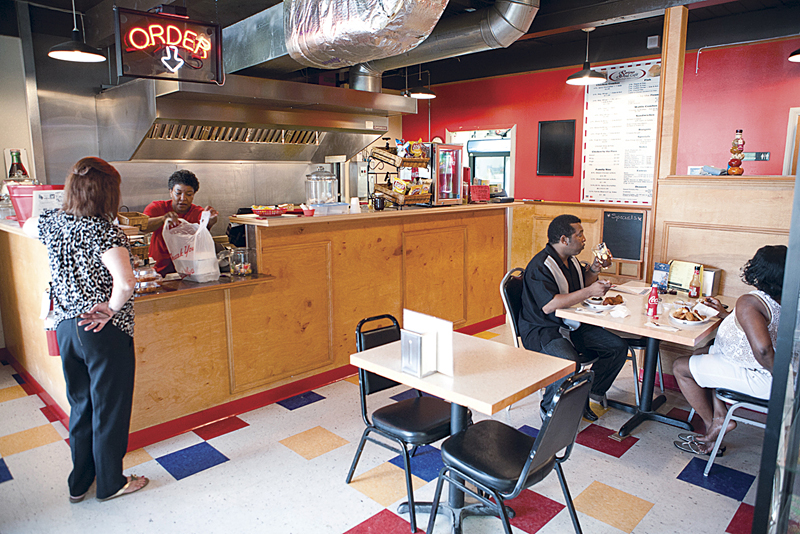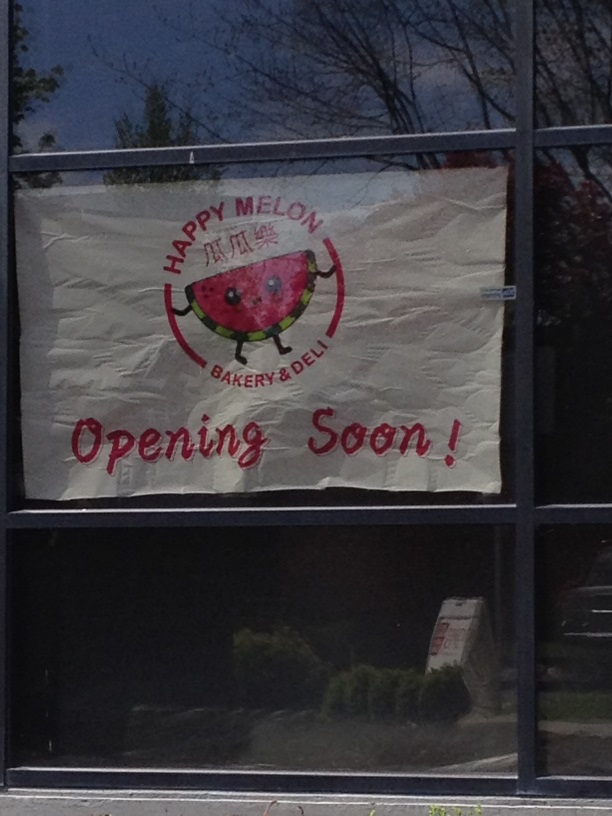About the name of Serious Soul, the Federal Way fried chicken and catfish storefront that this month is quadrupling in size: “Serious” isn’t just another way of saying that the kitchen considers its output pretty doggone good, which is what it usually means when soul food maestros slap words like “tasty,” “heavenly,” or “Mama’s” over their front doors. Owner Diona Brady is as serious as a funeral cake about her three-year-old restaurant, which she launched after logging time as an undercover restaurant consultant.
It was Brady’s job to draw up improvement plans for struggling restaurants, and she doesn’t plan to replicate the mistakes she witnessed. A Seattle native, Brady decided to specialize in “the food we were raised on” because there weren’t too many other area restaurants serving the same.
“It’s just good business,” Brady explains. “We can’t go to Louisiana, so to speak.”
Brady is constantly activating her business acumen, adopting policies that might not occur to less serious restaurateurs. She limits customers to four corn dogs apiece, because she fears kids from a nearby school could wipe out her supply and force her to disappoint a diner of legal age. And since industrial meat and frozen vegetables are a tough sell in this corner of the country, she uses all-natural Draper Valley Farms chicken and fresh greens from the independently-owned Charlie’s Produce.
“The corn we scrape off the cob,” she says.
But Brady’s sourcing raises the question of whether seriousness—at least as it pertains to ingredient integrity—is actually at odds with what’s commonly described as soul food nowadays.
Soul food is rooted in the African-American cooking traditions of rural inland Georgia, Alabama, Mississippi, Arkansas and east Texas, where make-do meals blended African cooking techniques with indigenous plants and imported pigs. In the antebellum South, black-eyed peas simmered with ham hocks and sweet potatoes baked in pie crusts without any help from powders or canned goods.
But the phrase “soul food” wasn’t coined until the 1950s, when processed foods dominated the urban American pantry. Northern-dwelling musicians and Black Power activists who wanted to reclaim the foods that saw their forebears through hard times ended up crafting a sentimental cuisine that was often greasier, fattier, sweeter and more artificial than its inspiration.
In many soul food restaurants, red Kool-Aid and chocolate cake from a box are as integral to the menu as hush puppies and pigs feet. Soul food acolytes tend to seek out dishes that emulate what their grandmothers cooked —and their grandmothers shopped at the A&P.
According to Adrian Miller, whose book on soul food will be published next year by the University of North Carolina Press, there are limits to soul food shortcuts: “Soul foodies will put up with banana pudding, cornbread and mac n’ cheese made from a mix, or cobblers and pies baked with pre-made pastry shells and canned fruit. But they’ll talk about you if the black-eyed peas, greens and sweet potatoes come out of a can and lack seasoning.”
In the course of his research, Miller visited more than 150 soul food restaurants in 16 states. “I’m not telling you how many pounds gained,” he jokes, which explains why “health-conscious” is now the hottest trend in soul food (Brady says she wants to add grilled fish and rotisserie chicken to her menu.) But Miller didn’t encounter many soul food chefs with a locavore streak.
“If Serious Soul is doing so, I think it’s a great ‘back to the future’ moment since, for some, soul food evokes images of home life in the rural South: raising a small herd of livestock, raising a sizable kitchen garden in the yard, and foraging for seasonal, wild fruit and greens,” he says.
Now here’s where I wish I could tell you that Serious Soul is challenging the dated definition of soul food with extraordinary dishes that should cause other cooks to rethink their inventories. I fervently wish it were true that well-tended chickens fry up better than their doctored cousins, and that collards are more delicious when Sysco’s never had its hands on them.
But the food at Serious Soul is mostly just fine, and hardly the stuff of revolution.
The influence of Brady’s sourcing is most evident at the cash register: By soul food standards, a Serious Soul meal is awfully pricy: Five jointed chicken wings cost $12.99, and a small serving of mashed potatoes runs $4.49. Orders are placed at a wooden counter set with a pickle jar, a soda cooler and a pair of stacked wicker baskets holding Cheetos and Cracker Jack. The method saves on gratuity—although if you can skip the tip after one of Brady’s relatives has spent 20 minutes frying a catfish filet for you, you’re a stronger service absolutist than me. Either way, plan on spending at least $40 on dinner for two.
“Some of our items are expensive,” Brady admits. “I hear that complaint until they actually try it and realize we’re using fresh produce.”
Serious Soul also concocts its own sticky-sweet barbecue sauce, sold by the Mason jar and brushed over floppy St. Louis-cut spare ribs, and a complex sweet tea that feels thick on the tongue. Brady won’t reveal what she adds to the basic sugar mixture, but the tea has a floral, Earl Gray character. It’s apparently a hit at Serious Soul’s many catering gigs: The new 75-seat dining room (annexed from a defunct Mexican restaurant) is already booked for a baby shower and a 90-year-old’s birthday party. Both celebrations are likely to be marked with sweets. If the guests of honor can be distracted from cake, Serious Soul serves an excellent nutmeg-tinged sweet potato pie with a buttery crust.
Not every supporting player on Serious Soul’s menu impresses. Collards taste flat, as though they’ve been rushed out of the pot, and a thick slice of cornbread pried from a cast-iron skillet was dry and overly sweet. Fried catfish flakes beautifully, although its coating was too salty the night I tried it. I preferred a juicy fried chicken with papery skin, served alongside a malty Belgian waffle with deep syrup pockets.
Serious Soul’s very best dishes harken back to Louisiana, which is a bit beyond the scope of classical soul food. A maroon-hued bog of porky red beans and rice is smoky and muscular, and the gumbo is as enticingly heavy and warm as a flannel shirt. A clear reminder of why “gumbo” is such a potent metaphor, the dish has just about everything in it: Bay shrimp line the bottom of the bowl, and a trawl of the spoon picks up a strip of fried catfish, sliced andouille sausage, bits of scallops and crab, a chicken wing and—yikes!—a hush puppy. The gumbo has a strong, peppery flavor that lashes out if you so much as glance at the tabletop bottle of Frank’s hot sauce.
Scholars can debate whether Brady’s gumbo counts as soul food. A Washingtonian’s seafood-studded salute to Cajun foodways, untouched by vestigial 1950s kitchen mores, presses mightily against the boundaries of soul food’s standard definition. It is surely African-American food, but—as Miller points out—that’s not always synonymous with soul.
Yet most of Brady’s customers—a demographic evenly divided between displaced Southerners who miss fried pork chops and pound cake and Northwest-born eaters who’ve been clued in to the Dixie diet by food television—may not care about culinary semantics. All they need to know about the gumbo is that it’s absolutely terrific.
Price Guide
Catfish dinner $12.99
Chicken and waffles $10.99
Ribs $13.99
Gumbo $13.99
Cornbread $2.49
Sweet Tea $2.49
Sweet Potato Pie $3.99








